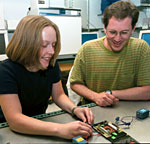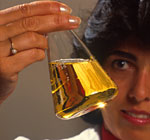Tip sheets highlight timely news and events at Washington University in St. Louis. For more information on any of the stories below or for assistance in arranging interviews, please see the contact information listed with each story.
A tool to thwart terrorists
Theory can help disable terrorists’ messages

An electrical engineer at Washington University in St. Louis has devised a theory that sets the limits for the amount of data that can be hidden in a system and then provides guidelines for how to store data and decode it. Contrarily, the theory also provides guidelines for how an adversary would disrupt the hidden information. The theory will have a major impact on homeland security applications.
Fooling the ‘brain’s Timex’
Biological clock more influenced by temperature than light

Getting over jet lag may be as simple as changing the temperature —your brain temperature, that is. That’s a theory proposed by Erik Herzog, Ph.D. assistant professor of biology in Arts & Sciences at Washington University in St. Louis. Herzog has found that the biological clocks of rats and mice respond directly to temperature changes.
Cooking oil slick
Vegetable oil spills hurt environment, too

Biologists at Washington University in St. Louis have documented unprecedented levels of speciation and diversification in Caribbean anolis lizards. The discovery is completely unexpected and challenges the way evolutionary biologists think of evolution.